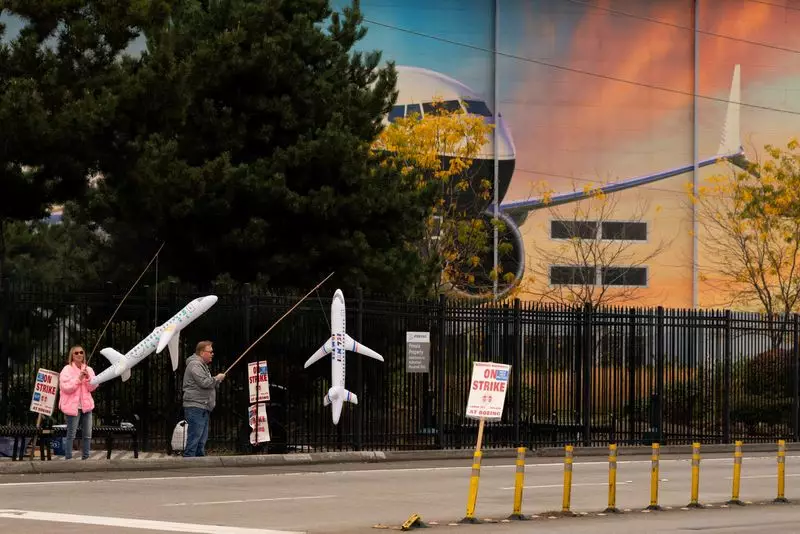Boeing, the iconic U.S. aerospace manufacturer, is facing one of the most challenging periods in its long history. Recent announcements made by CEO Kelly Ortberg reveal that the company plans to reduce its global workforce by a striking 17,000 employees, or around 10%, reflecting dire financial circumstances exacerbated by a month-long labor strike by unionized workers. This series of layoffs comes alongside the postponement of the much-anticipated first deliveries of the 777X jet by an additional year, pushing it to 2026. The confluence of these issues has led Boeing to project an eye-watering $5 billion in losses for the third quarter, prompting urgent questions about the company’s long-term viability and operational strategies.
The strike, involving approximately 33,000 workers on the West Coast, has essentially brought production of some of Boeing’s flagship jets, including the 737 MAX, to a standstill. Ortberg emphasized that these layoffs were essential to “align with our financial reality,” signaling an industry-wide recognition that performance must hinge on operational efficiencies, particularly in the face of a diminished revenue outlook. The conflict with the machinists’ union not only places immediate financial burdens on the company but also threatens to destabilize employee relations for the foreseeable future.
This labor dispute is not merely a contractual issue; it has become a substantial hurdle for Boeing’s recovery operations, placing added pressure on all stakeholders involved. Analysts suggest that the prospect of layoffs might embolden striking workers to negotiate a settlement quickly. However, the precariousness of the situation also underscores the urgent need for both sides to find common ground, as the ongoing production halts could result in far-reaching implications for the company’s reputation and financial standing.
Notably, the delay in delivering the 777X is symptomatic of broader systemic issues within Boeing. With expected revenues for the quarter now projected at $17.8 billion, coupled with a loss per share of $9.97, the company’s financial health appears increasingly fragile. Analysts had anticipated an even worse cash burn scenario, with predictions initially hovering near -$3.8 billion for quarterly cash flow. Such significant variances from expectations only heighten investor concern over Boeing’s future performance and operational capacity.
Boeing’s reputation has also taken serious hits. The company recorded pre-tax charges amounting to $5 billion for both defense and commercial plane operations, indicating a troubling trend in profitability. The decision to end the 767 freighter program in 2027, despite a commitment to the KC-46A tanker project, reflects a sharper focus on prioritizing operational efficiency over historical commitments. Such strategy adjustments, however, may lead to diminished production capacity long term, further complicating Boeing’s already tenuous market position.
Regulatory issues add another layer of complexity to the situation. The Federal Aviation Administration (FAA) has faced significant criticism for its oversight capabilities over Boeing’s production processes, which could further damage the manufacturer’s standing with regulators and the public. A recent court hearing examined Boeing’s offer to plead guilty to fraud regarding a prior scandal, suggesting that even as the company seeks to stabilize worker relationships and operational metrics, it is still grappling with past missteps that threaten its credibility.
Boeing also finds itself requiring substantial capital to forestall a downgrade of its investment-grade credit rating. With current debt levels approaching $60 billion, the company is reportedly investigating various avenues to raise between $10 billion and $15 billion, either through stock sales or equity-like securities. This financial maneuvering underscores pressing liquidity concerns, highlighting how the dual pressures of a declining workforce and a protracted strike could exacerbate the financial crisis.
Boeing is currently at a crucial crossroads, facing not only immediate financial challenges but also a potential reshaping of its long-term strategic vision. The newly appointed CEO’s commitment to re-establishing trust and effectively managing labor relations will be pivotal. As stakeholders watch closely, any missteps in negotiations or production strategies could further entrench Boeing’s struggles. For those invested in the company’s future, one thing remains apparent: the outcomes of the coming weeks could determine whether Boeing steers into smoother skies or continues to navigate turbulent air.

